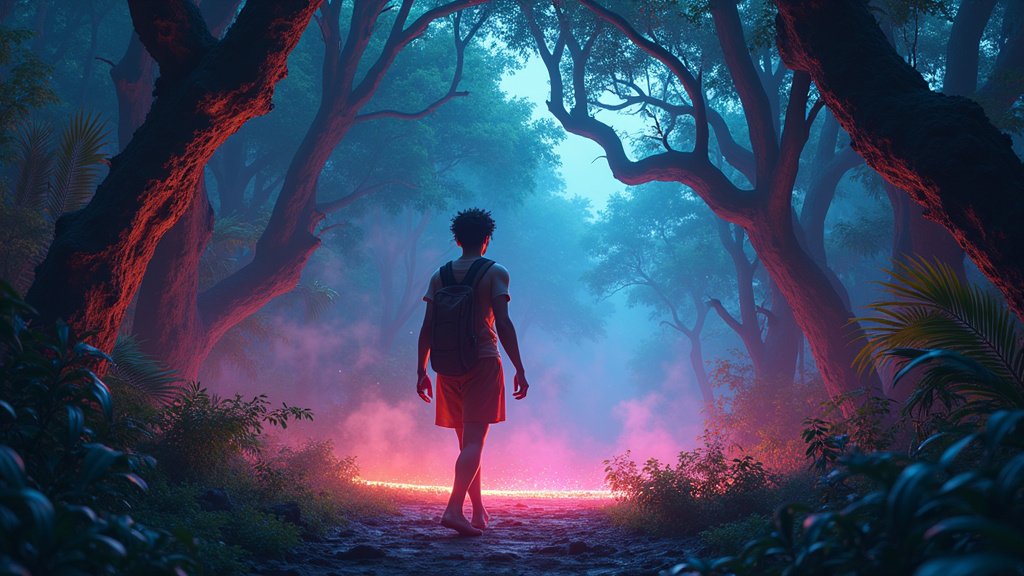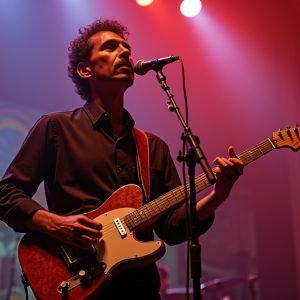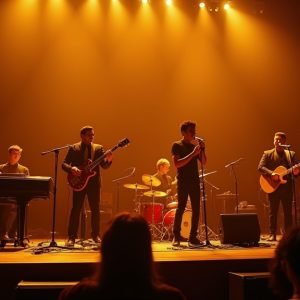Zurich-born artist AKIRA is set to unveil his groundbreaking debut album, ‘Niños del Bosque,’ on August 18, 2025, marking a significant moment in contemporary latin music as he introduces a unique subgenre he terms “Psychedelic Cumbia.” This highly anticipated record, whose title translates to “Children of the Forest,” has already garnered attention through early premieres on platforms like Music Crowns and Pressparty, and through prior coverage from outlets such as RedBull and 3FACH.
Born to an Argentinian father and a Swiss-French mother, AKIRA’s multicultural heritage deeply informs the album’s sonic DNA, creating a bridge between continents, generations, and diverse music traditions. He blends the rhythmic heartbeats of Latin America with European precision and a distinctive psychedelic haze, forging a sound that is both ancient and innovative.
The Genesis of Psychedelic Cumbia
While AKIRA is credited with carving out his unique lane of “Psychedelic Cumbia,” the genre itself has historical roots. “Psychedelic Cumbia” first gained prominence in Peru during the late 1960s and 1970s, often referred to as “chicha.” This earlier iteration saw traditional cumbia rhythms infused with elements of surf and psychedelic rock, utilizing electric guitars and organs. It spread throughout Latin America, influencing music in Colombia, Venezuela, Chile, and Mexico. AKIRA’s rendition, however, is presented as a reinvention for a new generation, incorporating dub-infused basslines and cinematic atmospheres to create something both familiar and groundbreaking.
An Immersive Sonic Journey
‘Niños del Bosque’ is more than just a collection of songs; it is crafted as an immersive experience, a living, breathing world of sound that invites listeners to explore rather than simply skim. The album is described as a bold and soul-stirring exploration of Latin American heritage, spiritual resistance, and modern psychedelic soundscapes. AKIRA aims to revive a revolutionary spirit that connects, empowers, and moves people, stating that “Everyone who listens to this music automatically becomes a Niña/Niño del Bosque.”
The album’s thematic depth is inspired by the mythic spirit of Studio Ghibli’s Princess Mononoke, grounding its narrative in real-world themes of love, loss, and resistance. AKIRA seamlessly weaves physical and spiritual experiences throughout the tracks, creating a rich soundscape with reverberated vocals, layered guitars, and dynamic percussion.
Standout Tracks and Their Resonance
Among the album’s 11 tracks, several stand out for their distinct contributions to the overall narrative and sound.
* ‘Kumbia de los Pájaros’: This opening track acts as an invitation into a ceremonial space where nature, memory, and movement converge. Its folkloric pulse, driven by percussive rhythms and shimmering reverberated guitars, evokes the heartbeat of a forest.
* ‘Mononoke’ and ‘La Del Ladrón’: These tracks showcase AKIRA’s ability to infuse social commentary into danceable grooves. They provoke reflection, demonstrating that joy and resistance can coexist as partners in the dance of life. ‘Mononoke’ particularly carries a theme of warrior pride.
* ‘Abuelita’: Serving as a moving closer, ‘Abuelita’ intertwines personal memory with ancestral homage. The song’s depth is subtly influenced by Ayahuasca visions and the profound weight of identity, providing a poignant conclusion to an album deeply concerned with roots, both literal and metaphorical.
* ‘Cumbia del Bosque’: Described as a rallying point, this track serves as a rebellious call for listeners to gather and dance in defiance of silence, setting an energetic tone.
* ‘Espíritu’ and ‘Ixchtel / Mi Salsa’: These songs highlight AKIRA’s skill in blending the physical and spiritual, functioning as love songs that are grounded in tactile experiences, such as working hands and shared dances.
The Impact of ‘Niños del Bosque’
Through ‘Niños del Bosque,’ AKIRA not only presents a fresh take on latin music but also delivers an album that balances high-energy celebration with meditative reflection. His artistry combines traditional Latin genres like Cumbia, Salsa, and Bachata with rock, dub, and urban styles, influenced by legends such as Prince, Diego El Cigala, Bob Marley, and Carlos Gardel. The album is designed to make listeners move, think, and dream simultaneously, establishing itself as a vital contribution to both the dancefloor and the broader cultural conversation.
As anticipation builds for its release, early reviews and premieres suggest that ‘Niños del Bosque’ promises to be a compelling listen that challenges traditional boundaries and cultivates a unique auditory landscape.


























